Abbey Surname Ancestry ResultsOur indexes 1000-1999 include entries for the spelling 'abbey'. In the period you have requested, we have the following 255 records (displaying 151 to 160): Single Surname Subscription | | | Buying all 255 results of this search individually would cost £1,422.00. But you can have free access to all 255 records for a year, to view, to save and print, for £100. Save £1,322.00. More... |
These sample scans are from the original record. You will get scans of the full pages or articles where the surname you searched for has been found. Your web browser may prevent the sample windows from opening; in this case please change your browser settings to allow pop-up windows from this site. Bribed in Hull
(1854)
A Bill for the Prevention of Bribery in the Election of Members to serve in Parliament for the Borough of Kingston-upon-Hull, passed 11 April 1854, stated that a commission of inquiry 30 August 1853 had found that over a hundred voters were bribed at one or more of the elections for the borough in 1841, 1847 and 1852: the names of those bribed, and those who gave the bribes, were listed in the bill, and all those persons were disqualified from any future parliamentary elections for the borough.ABBEY. Cost: £4.00.  | Sample scan, click to enlarge
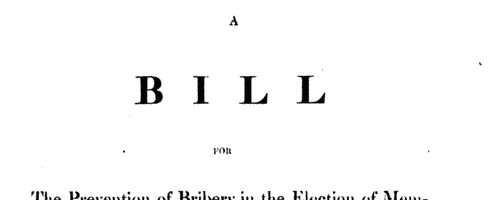
| Deaths, Marriages, News and Promotions
(1855)
Death notices and obituaries, marriage and birth notices, civil and military promotions, clerical preferments and domestic occurrences, as reported in the Gentleman's Magazine. Mostly from England and Wales, but items from Ireland, Scotland and abroad. January to June 1855
ABBEY. Cost: £4.00.  | Sample scan, click to enlarge
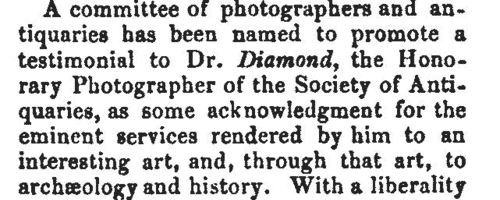
| Missionary donations from Yorkshire
(1855)
The Congregational and a number of other independent churches together formed the Evangelical Alliance, committed to promoting and supporting missions to the heathen. The areas chosen for their projects were Guiana, South Africa, India, the South Seas and China. The work of the missionaries was not only in preaching the Gospel, but also in translating the Bible into local languages, and establishing churches, schools and orphanages. Orphans and native teachers were often given the names of principal contributors or congregations back in Britain. In Britain the large amounts of money needed for this work were raised among the Congregational and independent congregations, arranged by auxiliaries for each county (although some contributions for each county might in fact come in from congregations and individuals in neighbouring areas); money was gathered by ministers, at special services, by supporters, and in missionary boxes. The accounts of all these contributions were published as part of a monthly magazine called the Evangelical Magazine. Each issue of the magazine carried obituaries of prominent members of the congregations; general articles on religion; reviews of newly-published religious books; home news, mainly about meetings of importance or interest by the alliance or in individual churches; and then a separate section called the Missionary Chronicle. The Missionary Chronicle was devoted to letters and reports from the missionaries; and concludes with a set of accounts of donations towards the missionary work. This is the index to the donations reported in the magazine, January to December 1855, from Yorkshire.ABBEY. Cost: £6.00.  | Sample scan, click to enlarge
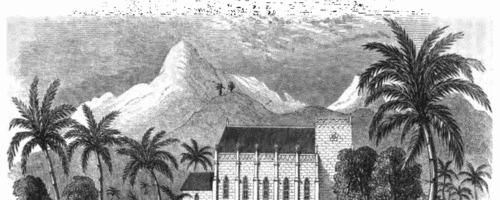
| Unclaimed Dividends
(1855)
The unclaimed dividend books of the Bank of England, containing names and descriptions of over 20,000 persons entitled to many millions of pounds accumulated in the bank unclaimed during the 18th and 19th centuries, mostly in consols and annuities, and transferred to the Commissioners for the Reduction of the National Debt.
ABBEY. Cost: £6.00.  | Sample scan, click to enlarge

| Gentry in London
(1856)
The Post Office London Directory for 1856 includes this 'Court Directory', listing alphabetically by surname and christian name the upper class residents of the capital with their postal addresses. 'In order to afford space for the addresses, the abbreviation "esq." for esquire has no longer been appended to each name in the Court Directory. It should be understood that such should be added to the name of every gentleman in the following pages to which no inconsistent addition is affixed.' Decorations, honours &c. are generally given. Some gentlemen appear who are also listed (as professional men, &c.) in the commercial section. Those with second residences in the provinces usually have the country address given as well.ABBEY. Cost: £4.00.  | Sample scan, click to enlarge

| Hare Coursing Competitors at Market Weighton (1856)
Names of competitors from results recorded in the Coursing Calendar for September to December 1856; in which the meetings are listed chronologically, giving precise dates and the names of the presiding officers (stewards, judge, slipper, field officer, secretary). In each heat two greyhounds are raced, the winner from each pair proceeding to the next heat. Each dog is identified by its name and that of its owner. The parents of the winning dog are usually stated. The name of each competition is given with the number of nominations, the stakes and prizes. There are also occasional matches between particular dogs. These abbreviations are used: b. bitch; bd. brindled; be. blue; bk. black; br. l. broken leg; cr. cream; d. dog; dn. dun; dr. (with)drawn; dr. l. drawn lame; f. fawn; gr. grey; p. puppy; r. red; t. ticked; tn. tanned; w. white.
ABBEY. Cost: £8.00.  | Sample scan, click to enlarge
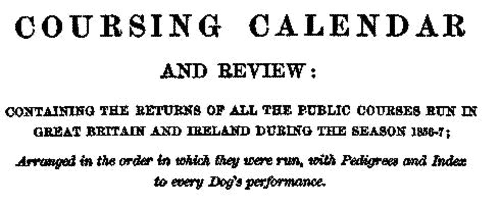
| Hare Coursing Competitors at Tadcaster (1856)
Names of competitors from results recorded in the Coursing Calendar for September to December 1856; in which the meetings are listed chronologically, giving precise dates and the names of the presiding officers (stewards, judge, slipper, field officer, secretary). In each heat two greyhounds are raced, the winner from each pair proceeding to the next heat. Each dog is identified by its name and that of its owner. The parents of the winning dog are usually stated. The name of each competition is given with the number of nominations, the stakes and prizes. There are also occasional matches between particular dogs. These abbreviations are used: b. bitch; bd. brindled; be. blue; bk. black; br. l. broken leg; cr. cream; d. dog; dn. dun; dr. (with)drawn; dr. l. drawn lame; f. fawn; gr. grey; p. puppy; r. red; t. ticked; tn. tanned; w. white.
ABBEY. Cost: £8.00.  | Sample scan, click to enlarge
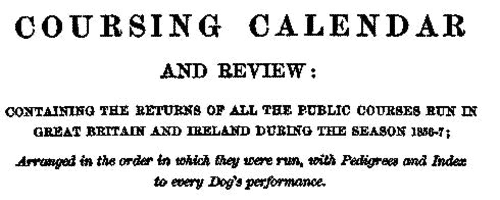
| Insolvents
(1856)
Insolvency notices for England and Wales: insolvency often caused people to restart their lives elsewhere, so these are an important source for lost linksABBEY. Cost: £6.00.  | Sample scan, click to enlarge

| Traders and professionals in London
(1856)
The Post Office London Directory for 1856 includes this 'Commercial and Professional Directory', recording over 100,000 individuals. ABBEY. Cost: £4.00.  | Sample scan, click to enlarge

|  Persons of standing recommending London police recruits
(1843-1857) Persons of standing recommending London police recruits
(1843-1857)
The Metropolitan Police Register of Joiners (MEPO 4/334) lists policemen joining the force 1 January 1843 to 1 April 1857 (warrant numbers 19893 to 35804). The register is alphabetical, in so far as the recruits are listed chronologically grouped under first letter of surname. It gives Date of Appointment, Name, Number of Warrant, Cause of Removal from Force (resigned, dismissed, promoted or died), and Date of Removal. Although the register was closed for new entrants at the end of 1842, the details of removals were always recorded, some being twenty or more years later. Those recruits not formerly in the police, the army, or some government department, were required to provide (normally) at least two letters of recommendation from persons of standing, and details of these are entered on the facing pages. Where a recruit was only recently arrived in the metropolis, the names and addresses of the recommenders can be invaluable for tracing where he came from. Those recruits not formerly in the police, the army, or some government department, were required to provide (normally) at least two letters of recommendation from persons of standing, and details of these are entered on the facing pages: the names in these are indexed here (the police recruits are indexed separately and not included here). Recruits transferred from other forces or rejoining the force did not normally need recommendations - in the latter case, former warrant numbers are given - but some recommendations are from police inspectors, even other constables. Recruits coming from the army sometimes have general military certificates of good conduct, but most often have a letter from their former commanding officer; recruits recommended by government departments (most often the Home Office) similarly have letters from the head of department. But the great majority of the names and addresses in these pages are of respectable citizens having some sort of personal acquaintance with the recruit. Where more than two recommendations were provided, the clerk would only record one or two, with the words 'and others'. Tradesmen are sometimes identified as such by their occupations; there are some gentry. Although the bulk of these names are from London and the home counties, a scattering are from further afield throughout Britain and Ireland. ABBEY. Cost: £8.00.  | Sample scan, click to enlarge

|
Research your ancestry, family history, genealogy and one-name study by direct access to original records and archives indexed by surname.
|













